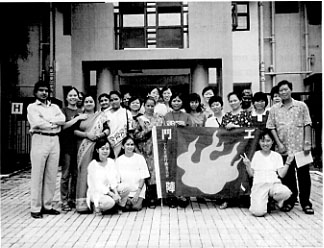Report on the
|

|
|
|---|---|---|
|
CAW had 28 persons participating in the workshop, including interpreters, resource persons and the secretariat. The training adopted a creative and new approach by combining analytical, organizing skills training for women workers and organizers - with theatre and dynamics games methodology, in dealing with gender sensitivity issues.
The partcipants were mostly women workers and organizers, who are also trainers in their own countries. They have all been involved in educational and organizing work, one way or the other, but all at various different levels. Morever, due to the vast differences in language, cultural, socio-economic and political contexts from which our particpants came from, much time and attention were spent in getting to know each other, and understanding the workshop, as well as familiarizing each other on the work we do. The main concerns of the participants and the problems/issues |
faced by women workers in their respective countries, were shared throughout the workshop process, so that the training programme was made as relevant as possible to their work back home.
CAW put together a strong 6-persons resource team, which planned, moderated and facilitated the entire process. In order to ensure as far as possible that the cultural diversities of the region is reflected in the training, the team comprised of representatives from all the sub-regions i.e. South Asia (Sri Lanka), Southeast Asia (Thailand, Philippines) and last but not least, East Asia Hong Kong). Some focused on cultural, dynamics games and movement theatre skills, emphasizing on women issues, while others focused on issues of workers’ struggles and organizing . The first 2 days of the workshop were devoted to an introduction on movement theatre techniques and dynamics games for group |
formation, community building, confidence raising, organizing and awareness-building on gender sensitivity. Three Hong Kong women organizers and cultural -theatre activists facilitated the sessions excellently. The activities centred upon self-expressions, awareness-raising and understanding of the participants as women and as workers.
Reflection and sharing followed after every session to help the participants understand the aims and lessons learnt from the activities. This culminated on the second day in the use of Forum Theatre techniques to reflect and express the particular struggles and pains of women as workers and as organizers, as they fight for their rights and voice their concerns in their societies. Forum Theatre also creates space and opportunities for the participants to mimic changes women workers want to see in the situations they presented, so that they could be motivated to find new ways of |
Contents | 18 | Next Page
Asian Women Workers Newsletter Vol. 16 No. 4 October 1997